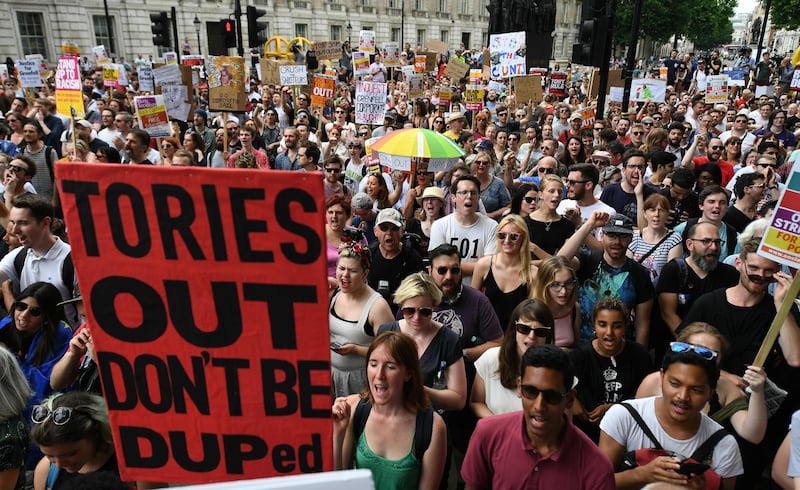A bucolic portrait of chickens wandering in woodlands near the village of Clogher in Northern Ireland is the highlight of the latest advertising campaign by Waitrose, the British supermarket chain.
This is a border region deeply affected by the United Kingdom's exit from the European Union. The legacy of 30 years of terror when the IRA fought the British army is still keenly felt. The nationwide spotlight, courtesy of the advertisers, is therefore a welcome boost.
It is also the constituency of Arlene Foster, the leader of the Democratic Unionist Party (DUP), the province's biggest party. The local representative last week squeezed a £1 billion (Dh 4.75bn) deal out of Theresa May to shore up the Conservatives following June's inconclusive general election.
It may take less than a minute to drive through the village but Clogher has a rich history that informs many of the choices facing the British and Irish as Brexit looms.
Dating back to the Iron Age, it was one of the first centres of Christianity in Ireland and then an important outpost in the settlement of Protestants by the English crown in the 1600s.
In the 20th century violence, known to all as the Troubles, there were least eight massive bomb attacks on its one main street. Today the courthouse (bombed in 1974) is a cafe, the police station (bombed in 1980) has been repaired but Shepherds Hotel (bombed in 1973) never reopened.
While controversial in the rest of the UK, the £1 billion in additional spending for Northern Ireland is justified here as a necessary infusion for towns that have not recovered from 30 years of conflict. Moreover, the extra cash is a boost for locals worried that Brexit will ultimately pitch the border area back into the hardships of division.
For example, investment in a new motorway to replace the nearby A5 would transform the western side of the British province. The expressway was promised by Tony Blair's government in 1998 Good Friday Agreement as a fast link between Derry on the north coast and Dublin, the capital of the Irish Republic. Much delayed, it was scrapped in the post-financial crisis austerity.
The deal also offers funding for entrepreneurs, a cut in corporation taxes for Northern Ireland as well as more state resources for education and healthcare. This is a boon for a region where unemployment and hospital waiting lists are well above the UK average.
In a nutshell the £1 billion, possibly more, is the price that the DUP has put on power for the Conservatives. As a party that represents all economic classes on the Protestant side of the sectarian divide, the DUP must show its voters it has extracted concessions from the Conservatives, the party of austerity.
The election outcome has also granted the DUP an opportunity to shape the Brexit negotiations, which also started last week. Trade is key. Chickens, such as those highlighted in the Waitrose advertisement, might cross the open border three or more times without any hindrance. Raised in Northern Ireland, processed in the Republic, packed back in the north and then sent south again to the ports.
If London opts to leave the EU's customs union, cross-border traffic would face disruption. How can the DUP ensure their supporters are not penalised by Brexit?
Downing Street has agreed to allow a joint Conservative-DUP steering committee oversee the work of the British government. This committee is the platform for the DUP to influence the Brexit negotiation with Brussels.
While Northern Ireland voted strongly to Remain (55 per cent to 45 per cent), the DUP is a British nationalist party campaigned strongly for Leave. The party's rank-and-file fetishise a purist ideal of British sovereignty.
Whatever their allegiances, politicians in Northern Ireland are strongly attuned to the importance of trade and economic development. Excessive reliance on extra government spending from Whitehall is a poor substitute for trade and thriving businesses. When David Davis, who leads the negotiations with Brussels, claimed technology can facilitate tracking of goods by a newly established customs bureaucracy there was a shudder among business north and south of the Irish border. An alternative mooted is establishment of custom points at British ports and airports, effectively preserving an all-Ireland free trade zone.
The Irish border therefore matters for the DUP in the way that the mainland Conservatives would never comprehend. The Belfast party is loathe to lose the access to European markets that is symbolised by the open roads leading to the Republic.
Should the politicians fail to secure a Brexit deal that preserves the current set-up, Clogher's residents know the consequences for everyday life are immense.
The queues of cars that waited to pass through British army security checkpoints on the frontier are now a recent memory. Older residents recall a childhood spent shuttling between north and south carrying sugar or cigarettes hidden under their clothes to avoid customs duties.
In these parts, history is always a guide to the future.
How history guides the future in the complicated world of Brexit negotiations
Visiting the front line of Brexit talk in the unlikely spot of Clogher in Northern Ireland

Comment Latest
COMMENT




